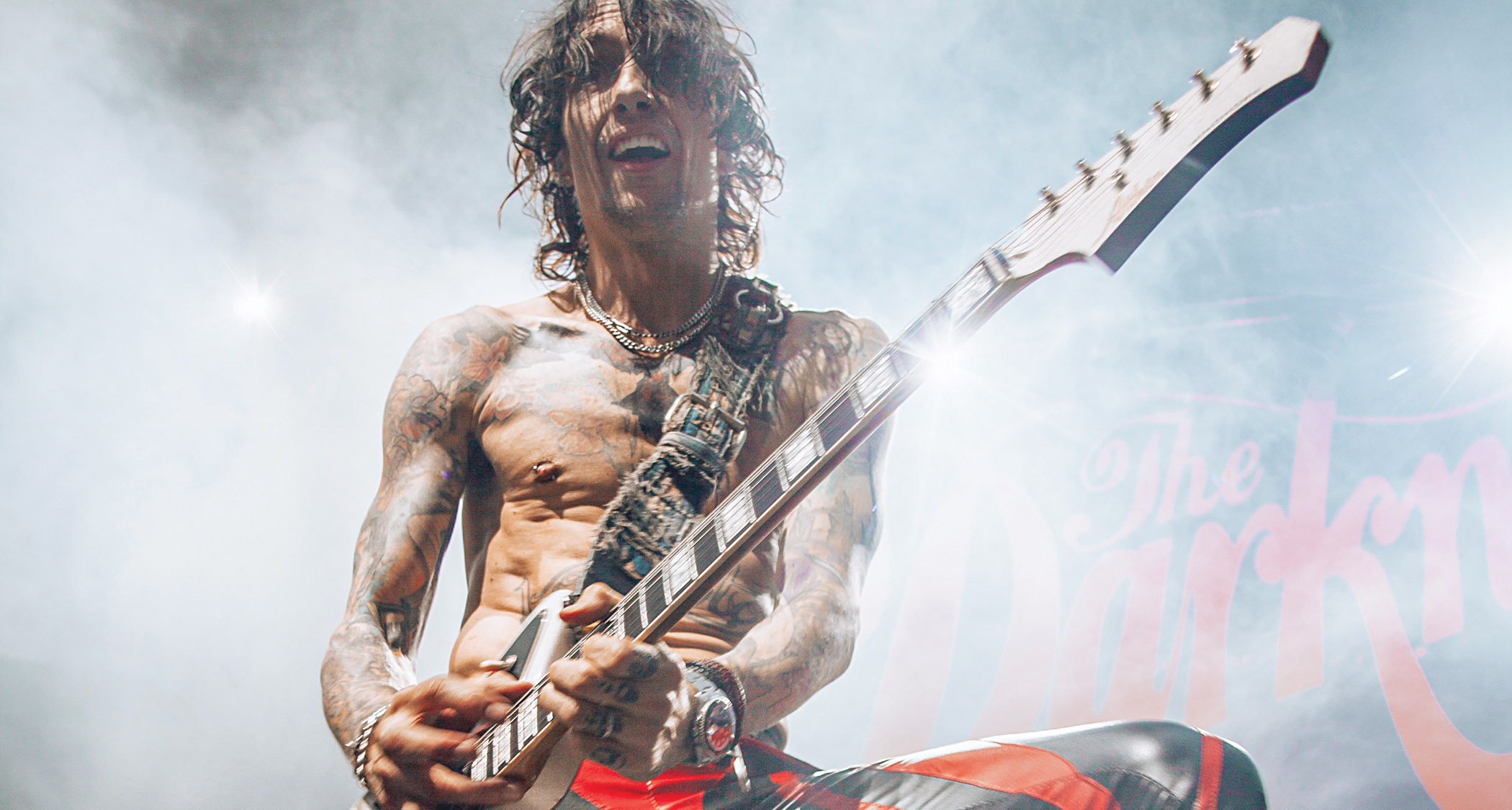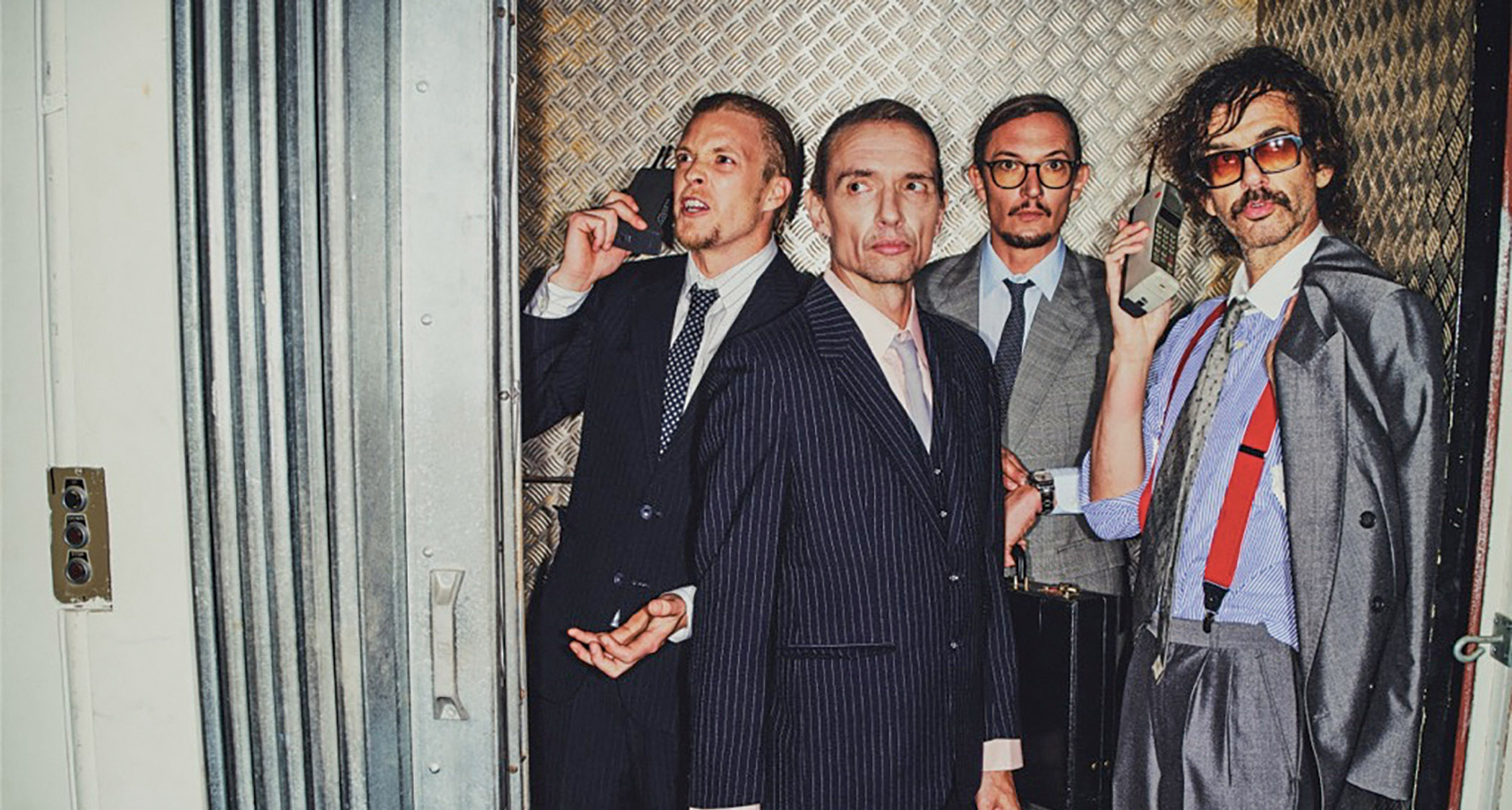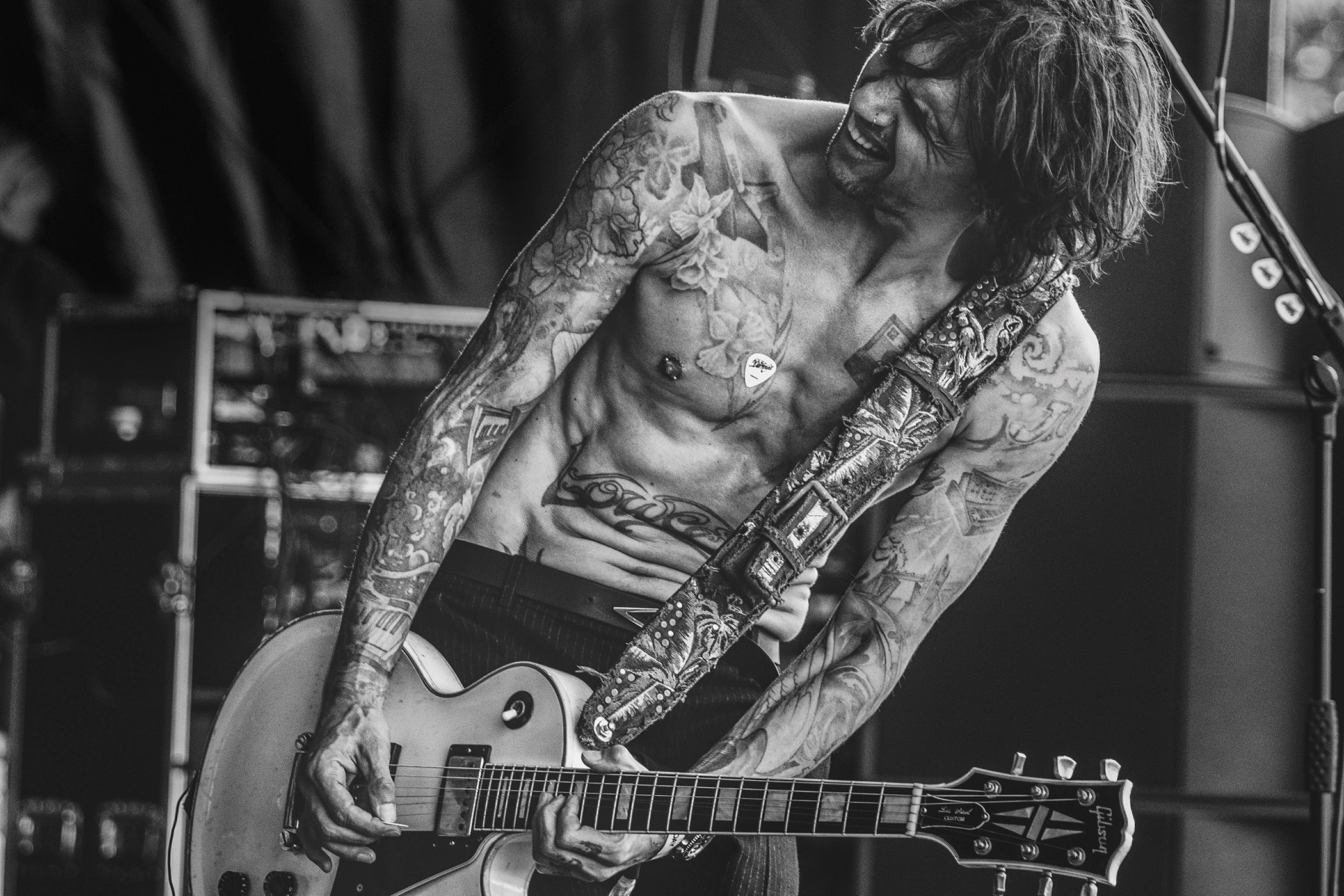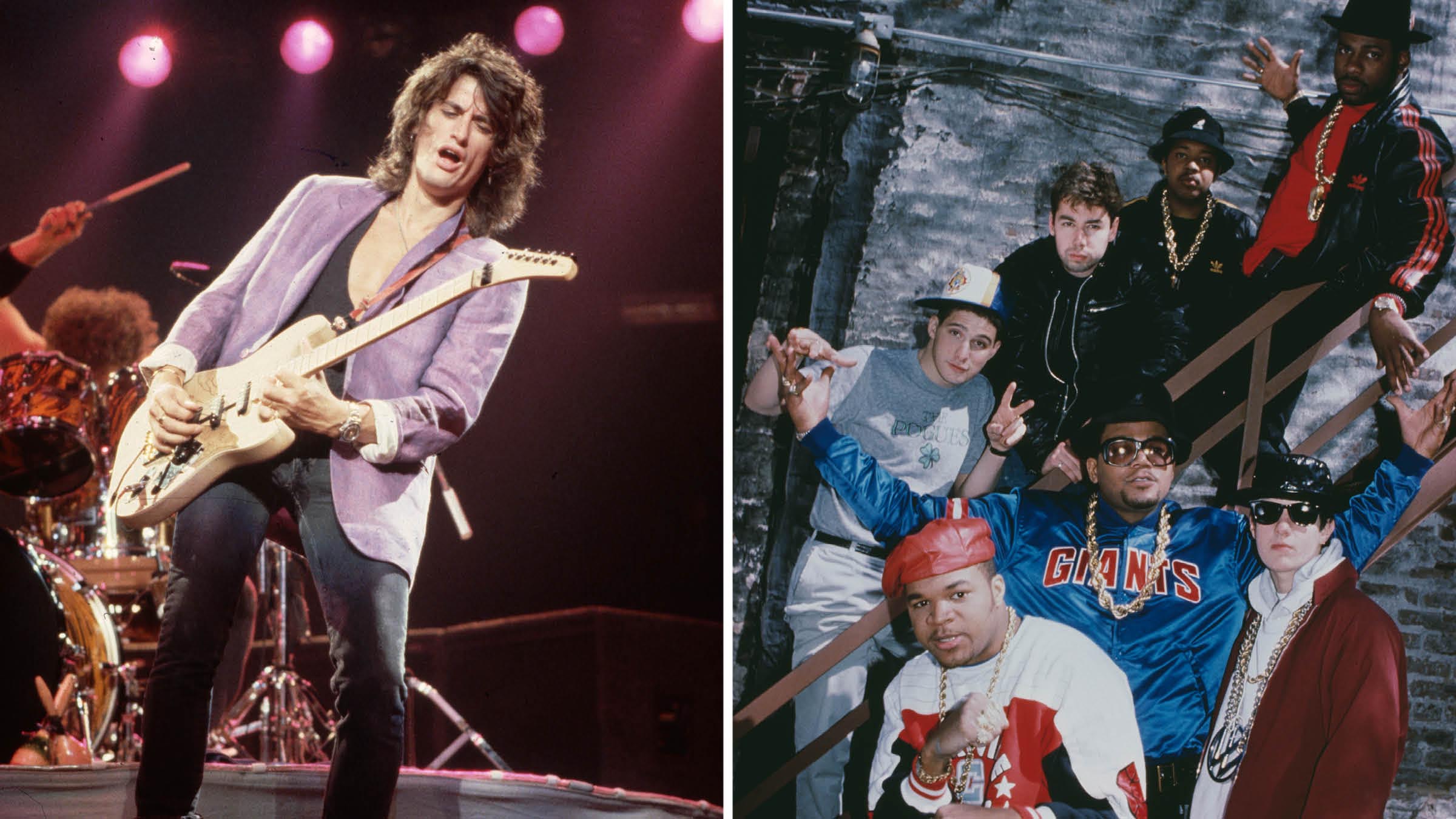“I’m not a big fan of bands that take themselves too seriously. Look at Angus Young. He’s a grown man who wears a schoolboy uniform”: Justin Hawkins unfiltered – the inside story of the rise, fall and rebirth of the Darkness
This is the story of a band who blew up, broke up, and got back up again with an appetite to record the album of their lives. And Justin Hawkins admits, he's lucky to be be alive to tell the tale

All the latest guitar news, interviews, lessons, reviews, deals and more, direct to your inbox!
You are now subscribed
Your newsletter sign-up was successful
Seemingly out of nowhere, the Darkness swooped out of Suffolk, England, and onto the international music scene in 2003 with their high-voltage debut, Permission to Land.
At a time when hipster bands including the Strokes, the White Stripes and Kings of Leon were making inroads with the alt-rock community, the Darkness were an anathema, wearing loud, glam-influenced outfits and bashing out energetic anthems propelled by white-hot power chord riffs, flashy leads and sometimes ridiculous-sounding falsetto vocals.
Many rock fans embraced the exuberance of the anachronistic quartet, composed of frontman Justin Hawkins, his guitarist brother Dan, bassist Frankie Poullain and drummer Ed Graham. But music purists dismissed the Darkness as a parody band, comparing them to Spinal Tap instead of aligning them with their true heroes, Queen and AC/DC.
Songs that abounded with double-entendres about genital herpes (Growing on Me), masturbation (Holding My Own) and a mythical demon-dog (Black Shuck) only fueled the rock-satire accusations. Regardless, the album quickly topped the U.K. charts – where it went quadruple platinum – and hit Number 36 on the Billboard 200 in the U.S., where it went gold.
To this day, Justin Hawkins admits he is drawn to the ribald, even juvenile lyrics and antics of AC/DC and has always believed that a good sense of humor makes rock ’n’ roll more fun. He also cops to being a big fan of This Is Spinal Tap, but stops short of accepting that the Darkness were ever intended to emulate Tap.
“We confused a lot of people at first because what we were doing was desperately unfashionable in 2003,” says Hawkins, wearing a checkered flannel shirt, a black, flower-patterned acoustic resting in a stand beside his office studio chair.
“Some people saw us as a throwback. And then, because of the wittiness of the lyrics, other people thought they were somehow the subjects of a joke and we were trying to make fun of them, which wasn’t the case at all.”
All the latest guitar news, interviews, lessons, reviews, deals and more, direct to your inbox!
What made Permission to Land and its similarly structured 2005 follow-up One Way Ticket to Hell… and Back so enjoyable – aside from the abundance of great ham-fisted riffs – was that the Darkness were outrageous to the point of being comical, but they were never condescending; most of the time, their jokes were aimed at themselves.
“I’m not a big fan of bands that take themselves too seriously,” Hawkins says. “Look at Angus Young. He’s a grown man who wears a schoolboy uniform, and AC/DC’s lyrics have always been ridiculous. But they’re great and they’re entertaining. As for Queen, their approach was bombastic and pompous, but you can’t deny the tonality of the guitars or the quality of the songs.”

As much as they shook the rock landscape with their first two offerings, the Darkness entered uncertain territory in 2006.
Even without factoring in the rock parody element, the band’s look and sound relied on a certain shtick that seemed time-stamped. To continue to evolve, they needed to establish themselves as more than rousing, flamboyant rockers.
For a while they struggled, yet somehow, they’re defied all odds, surviving the test of time and developing into a more adventurous, eclectic band with their new, eighth album, Dreams on Toast, which injects pop balladry, moustache-in beer country and singer/songwriter alt-rock into the band’s musical oeuvre.
However, even when the Darkness were at their commercial peak, Hawkins harbored no ill will against anyone who bet against the Darkness lasting more than a few more years, let alone emerging in 2025 with a bold new sound and their best record since their debut.
I wouldn’t have expected myself to be alive. I was living in a pretty intense way. If I had kept going, I imagine I would have died
In fact, back in the early 2000s, he might have put money on himself in a death pool that predicted he wouldn’t be around to see the next decade.
“I wouldn’t have expected myself to be alive,” he says. “I was living in a pretty intense way. If I had kept going, I imagine I would have died. That could have happened. I wasn’t built for comfort. I think one of the things that gave the Darkness gravity was that I was in that world of drugs and alcohol, and I was trying to do it ‘properly,’”
During a candid and often humorous conversation, Hawkins discussed the band’s wild ride, the hands-on approach for the new album, the addiction that could have ended the Darkness, the band’s six-year breakup and how the passing decades have made Hawkins and his bandmates more willing to compromise and more eager to experiment.
Dreams on Toast is a development from other records. Some of it rocks like a beast, but you’ve got a country song on there and some MOR rock. Why the evolution?
“We started writing it about three years ago, and we had more time to spend on it because we had the Permission to Land 20th-anniversary tour, so we were able to write during that time.
“We’ve always been focused, but this time we could be super-discerning about all the choices we made. We’re really confident in every song on this record, including the bonus tracks. There's nothing superfluous or unnecessary; even the ridiculous arrangements are justified.”

Were you unhappy with your last album, 2021’s Motorheart?
“It wasn’t our most unified record. We worked on it during the pandemic, and Welcome Tae Glasgae is the only song where we were all working together in a socially distanced way in a room.
“The rest of the time, Dan sent backing tracks and he was socially distanced recording drums and building tracks. This time we wrote everything together, which made an enormous difference because you fight for every note and every word.”
Is writing together a confrontational process for you?
“It used to be when we were younger and stubborn, but I think we all listen to each other more now. At the same time, we're not conflict-shy. We’ll fight for what we believe in, and that can cause some rather frustrating moments. But we’ll entertain every proposition and try out every idea, which allowed us to make this record as good as it is.”
Sometimes, having lots of time means being oversaturated with ideas, which can lead to creative constipation or bitter stalemates.
“We’ve grown up a bit and were open to anything, so that wasn’t a problem. Plus, we took advantage of the time we had. You don't often get the luxury of spending three years making a record.
“Most of the time you've got a small window to write and an even smaller window to record. Everyone’s stressed out, and you're only doing it to justify continual touring. One of the important things was to write riffs that make the guitar the prominent and powerful voice in the arrangement.”
You experimented with different styles. Did you also use different tunings?
“Oh, no. I like a standard-tuning guitar. There’s not a semitone down across the board. If you can’t put your ideas across with that, you're in trouble anyway, I think.”
Do you tend to rely on the minor pentatonic scale to achieve traditional rock leads?
“There are a lot of moments when it’s pentatonic, but I go for harmonic minor stuff as well. I like a ninth in a solo because I think it forces you to decide whether you're going to go up or down from there. You can’t just have it suspended in no man’s land. You have to make a choice.
“Pentatonic is a go-to thing when you’re building a solo. But I tend to think of a solo as a collection of phrases that you’ve bastardized and made your own. And I’ve got a couple licks that I don’t think anyone else does that sounds like a spider crawling across the fretboard.”
Some might call that an exercise in indulgence. How do you make that work with the more conventional guitar styles on the album?
“There’s a lot of melodic stuff you can immediately cling to, but I like to add in stuff that makes you scratch your head a bit, and fast bits with a lot of dive bombs. During the pandemic I taught myself how to play slide guitar with traditional tuning, and I added that to this album as well, just to express myself in a different way.”
You’re best known for bombastic crowd-pleasers like I Believe in a Thing Called Love, One Way Ticket, Get Your Hands Off of My Woman and the new Rock and Roll Party Cowboy. Did you have reservations about putting five songs on the new album that explore other styles, including country, dad rock, easy listening and folk-pop?
“Not at all. This is what we wrote, and we chased each song to its natural conclusion. Doing that led us down some genre explorations, but they work. And I think those five or six songs walk straight into the set and sit there nicely alongside all the other stuff from the last seven records, so I’m quite pleased with the balance of everything.”
Have you always had a soft spot for country music?
“I like the great, classic stuff, but it’s not like we went into the album saying, ‘We need country music on this album.’ There was one song in particular, Hot on My Tail, that had the beginnings – or like a shell – of a country sound in the melody, so we decided to chase it.
We went to the pub and said, ‘Well, what is it that makes a country song great?’ And we decided it all comes down to the Johnny Cash method: three chords and the truth
“We went to the pub and said, ‘Well, what is it that makes a country song great?’ And we decided it all comes down to the Johnny Cash method: three chords and the truth.”
Hot on My Tail sounds like a heart-on-sleeve song about lost love, but the lyrics are about a different kind of regret.
“We looked at some modern country songs and broke them down into common themes. You have some mention of a pickup truck, there might be beer involved, and girls – maybe going to a lake. It might mention Jesus and America.
“So I sat down with my list of themes and wrote a lyric about an unpleasant fart in an opportune moment just after the anniversary dinner of a couple that have been together for a long time. And the consequences of that fart are disastrous.”
Farts are always funny. Did you want to juxtapose the lovelorn with the comical?
“I wanted it to feel real and be about an experience that’s not necessarily universal, but certainly one that has impacted more than one relationship that I know of. It just resonated with me, so I went with it.
“There’s always a temptation to make bombastic rock music that is broad enough to expand your fanbase, and then there’s the temptation to only play the Darkness as we know it – to try to recreate the first album. And I think what I’m doing is rejecting all of that and doing whatever’s right for the song.
“At the end of the day if the song isn’t something we feel we can put across with the Darkness we’ll give it to someone else, ideally somebody in Nashville who can make a load of money with it.”
You touched on the self-indulgent lifestyle you had in the early 2000s. After One Way Ticket… you went to rehab. You’ve said there was a period of time when you were snorting up to five grams of cocaine a day and copiously drinking.
“I was in a place where I couldn’t care less about the effect [that] what I was doing was having on myself or anyone else. I was jeopardizing everything we all had worked for. I never talk about the low point, but I finally went to rehab. It wasn’t the first time I tried to get sober.
“It might have been the third or fourth, and I’m going back to way before the Darkness were successful. So this isn’t a Darkness fame issue. It’s a me issue. It’s addiction, which is a hard, complicated thing. But I’ve managed now to transfer my addictive urges into buying expensive clothes and fitness.”
Did your addiction lead to the breakup of the Darkness between 2006 and 2011?
“It wasn’t only about my behavior. It was also about how we were functioning as a creative entity. There’s a lot of factors to why we needed some time away from each other. There was a lot of pressure we were under, and we did a lot of work without ever taking a break.
“There were many days when we were getting burned out. We maximized all those opportunities and that made us the biggest band in England for a while. That was a hell of an achievement for a pub rock band from Lowestoft. But we never had a chance to sit back and smell the roses.”
You played reunion shows in 2011 and followed up with 2012’s Hot Cakes, which received a mixed reaction. Were you unhappy with the way it came out?
We all love this album because we’ve all fought for it. There were battles that we each lost, but we all accepted the results because the song won in the end
“It was a hard record to do because when we first started playing together again we were so worried about upsetting each other. So maybe we didn’t make the songs as good as they could have been.
“I think the albums we did were pretty polite and predictable. I think people were allowing things that they didn't really believe in to pass by, and I don't think any of us have that much love for those records.”
How long did it take you to reignite that creative flame?
“A long time. Motorheart was done mostly remotely, so we literally mailed it in. Maybe seeing how fans reacted to the Permission to Land 20th-anniversary tour in 2023 had something to do with getting us excited again because it wasn’t until we started working on Dreams on Toast that we all felt like we wanted to do something new and great.
“We all love this album because we’ve all fought for it. There were battles that we each lost, but we all accepted the results because the song won in the end. The right stuff happened, and we were able to grow in ways that make what we’re doing more enjoyable.”
- Dreams on Toast is out now via Cooking Vinyl.
- This article first appeared in Guitar World. Subscribe and save.
You must confirm your public display name before commenting
Please logout and then login again, you will then be prompted to enter your display name.




![The Darkness - I Believe In A Thing Called Love (Official Music Video) [HD] - YouTube](https://img.youtube.com/vi/tKjZuykKY1I/maxresdefault.jpg)


![The Darkness - Growing On Me [Live at Knebworth 2003] - YouTube](https://img.youtube.com/vi/t7oOlqD3VGY/maxresdefault.jpg)
![The Darkness - The Best Of Me [Live at Knebworth 2003] - YouTube](https://img.youtube.com/vi/H90mZp_NrhY/maxresdefault.jpg)
![The Darkness - Love On The Rocks With No Ice [Live at The Astoria 2003] - YouTube](https://img.youtube.com/vi/kwA_k73b5Bw/maxresdefault.jpg)
